|
|
|
Sort Order |
|
|
|
Items / Page
|
|
|
|
|
|
|
| Srl | Item |
| 1 |
ID:
106064
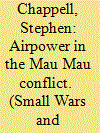

|
|
|
| 2 |
ID:
116256
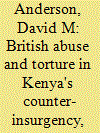

|
|
|
|
|
| Publication |
2012.
|
| Summary/Abstract |
Accusations of abuse and torture in the counter-insurgency campaign against Mau Mau rebels in Kenya were widely publicised during the 1950s. The typical British response was to issue official denials, and when prosecutions did arise the perpetrators were characterised as pathological, their behaviour presented as isolated and exceptional. New evidence found in the British colonial 'Migrated Archive' for Kenya now confirms that the practice of torture and abuse was widespread, amounting to a systematic pattern of state policy. This article rejects dispositional and individual explanations of British torture in Kenya and instead examines the violence in temporal and structural terms, showing how the toleration of violence at an early stage of the Emergency led to its institutionalisation in Kenya's detention camps at a later stage. The article offers evidence from the screening process in the first phase of the counter-insurgency campaign, and from the 'dilution technique' applied in the detention camps after 1956 in the final phase of the war to illustrate the argument. The concluding discussion explores the dilemmas confronting Kenya's colonial violence workers and their political masters as they struggled to present torture as lying within the 'rule of law'.
|
|
|
|
|
|
|
|
|
|
|
|
|
|
|
|
| 3 |
ID:
171188


|
|
|
|
|
| Summary/Abstract |
This article examines the Kenya Colony administration’s use of communal labor as a punitive, coercive labor practice during the Mau Mau rebellion of the 1950s. Faced with the Mau Mau rebellion, the administration transformed the preexisting communal labor system and began to use it on an unprecedented scale as a form of collective punishment against the mainly Kikuyu African civilian populations thought to be in collusion with the Mau Mau guerrillas. Communal labor, which was previously justified as a building block of development and used widely throughout the colony as cooperative village labor, now became an aspect of the punitive “rehabilitation” of the Kikuyu populace in Central Province. Although colonial officials directed Emergency communal labor against all of the African civilians living in the rural areas of Central Province thought to be in tacit support of Mau Mau, women were the corps of most of the communal labor work parties. As a result, this article examines the role of gender in the British administration’s wielding of communal labor as a punitive measure in Central Province during this time period. This window into the machinations of communal forced labor also sheds more light on the wider issue of gender and forced labor during the colonial period in Africa.
|
|
|
|
|
|
|
|
|
|
|
|
|
|
|
|
| 4 |
ID:
094745
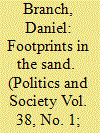

|
|
|
|
|
| Publication |
2010.
|
| Summary/Abstract |
Recent attempts to revive counterinsurgency strategies for use in Afghanistan and Iraq have been marked by a determination to learn lessons from history. Using the case of the campaign against the Mau Mau insurgency in Kenya of 1952-60, this article considers the reasons for this engagement with the past and the issues that have emerged as a consequence. The article disputes the lessons from British colonial history that have been learned by military planners, most obviously the characterization of nonmilitary forms of British counterinsurgency as nonviolent. Although it contests some of these supposed precedents for successful counterinsurgency in British military history, the article also identifies more generalizable elements of the Kenyan case. Particular emphasis is given to the effects on the nature of counterinsurgency, a reliance on locally recruited allies, and the decentralization of command.
|
|
|
|
|
|
|
|
|
|
|
|
|
|
|
|
| 5 |
ID:
116261


|
|
|
|
|
| Publication |
2012.
|
| Summary/Abstract |
The Foreign and Commonwealth Office charged the author of this article with the review and transfer of a large archive of colonial-era records, stored for many years at a government site at Hanslope Park near Milton Keynes, into the public domain by way of the National Archives at Kew. The discovery of this archive has raised considerable controversy in the press and bears on current court cases underway by alleged victims of violence meted out by colonial governments in places such as Kenya. This short essay examines the history of the unveiling and ongoing transfer of the treasure trove of colonial-era archival material.
|
|
|
|
|
|
|
|
|
|
|
|
|
|
|
|
| 6 |
ID:
040485
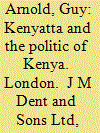

|
|
|
|
|
| Publication |
London, J M Dent and Sons Ltd, 1974.
|
| Description |
226p.Hbk
|
| Contents |
Includes bibliography, index.
|
| Standard Number |
046007878X
|
|
|
|
|
|
|
|
|
|
|
|
Copies: C:1/I:0,R:0,Q:0
Circulation
| Accession# | Call# | Current Location | Status | Policy | Location |
| 013421 | 923.1/ARN 013421 | Main | On Shelf | General | |
|
|
|
|
| 7 |
ID:
158211
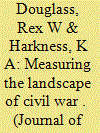

|
|
|
|
|
| Summary/Abstract |
Subnational conflict research increasingly utilizes georeferenced event datasets to understand contentious politics and violence. Yet, how exactly locations are mapped to particular geographies, especially from unstructured text sources such as newspaper reports and archival records, remains opaque and few best practices exist for guiding researchers through the subtle but consequential decisions made during geolocation. We begin to address this gap by developing a systematic approach to georeferencing that articulates the strategies available, empirically diagnoses problems of bias created by both the data generating process and researcher-controlled tasks, and provides new generalizable tools for simultaneously optimizing both the recovery and accuracy of coordinates. We then empirically evaluate our process and tools against new micro-level data on the Mau Mau rebellion (colonial Kenya 1952–60), drawn from 20,000 pages of recently declassified British military intelligence reports. By leveraging a subset of these data that includes map codes alongside natural language location descriptions, we demonstrate how inappropriately georeferencing data can have important downstream consequences in terms of systematically biasing coefficients or altering statistical significance and how our tools can help alleviate these problems.
|
|
|
|
|
|
|
|
|
|
|
|
|
|
|
|
| 8 |
ID:
116259
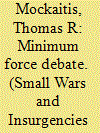

|
|
|
|
|
| Publication |
2012.
|
| Summary/Abstract |
No aspect of British counter-insurgency has been more problematic and controversial than the doctrine of minimum force. This common law principle provided ambiguous guidance for soldiers and police quelling unrest within a global empire and has become the subject of intense scholarly debate in the post-imperial era. The argument divides academics into two broad camps. One group sees minimum force as a vital element of a largely successful, uniquely British approach to counter-insurgency. The other claims that the legal principle never really restrained British security forces and considers the British approach to counter-insurgency neither unique nor particularly successful. This debate appeared in an exchange of views between John Newsinger and the current author in a 1990 volume of Small Wars and Insurgencies and more recently in a similar but lengthier argument between Rod Thornton and Huw Bennett in the same journal between 2007 and 2010.1
Such disagreements are of course endemic to academic discourse. This one, however, seems to be about more than history.
|
|
|
|
|
|
|
|
|
|
|
|
|
|
|
|
| 9 |
ID:
099857


|
|
|
|
|
| Publication |
2010.
|
| Summary/Abstract |
With strategic success in Iraq and Afghanistan far from certain, comforting beliefs about Britain's superiority at counterinsurgency have come under increasingly sceptical scrutiny. This article contributes to the debate with particular reference to the supposedly pivotal principle of minimum force. After discussing the recent literature on the subject, the article critiques the methodology employed by advocates of the traditionalist view on British COIN, arguing for a more rigorous historical approach based on primary sources. Following these historical matters, it is argued that conceptually, minimum force should be analysed dialectically in relation to practices of exemplary force, and above all, on the evidence of what happens in a conflict. Arguably the value ascribed to doctrine in strategic analysis has become unduly inflated, and we must look beyond it to understand war and political violence.
|
|
|
|
|
|
|
|
|
|
|
|
|
|
|
|
|
|
|
|
|